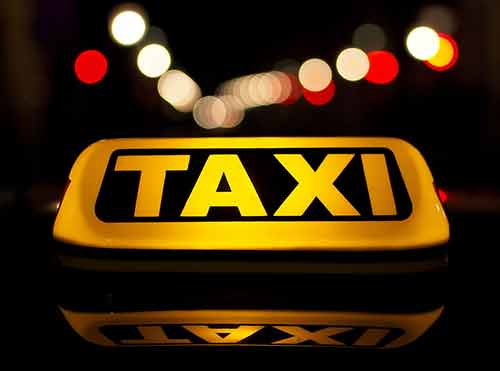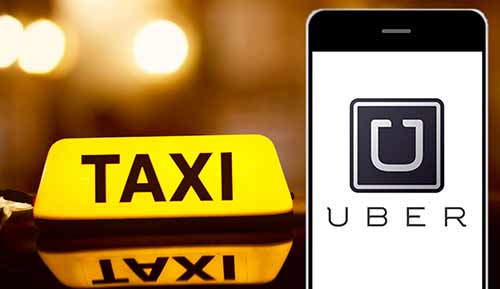Taxiuber7.com
You might not have heard of BlaBlaCar until now, but chances are you’ll be hearing much more about it in the future. That’s because the French ridesharing company has reportedly entered the elite group of unicorns, or startups worth more than a billion dollars.
TechCrunch reported today that BlaBlaCar has raised $160 million from the venture-capital firm Insight Venture Partners. The raise values the Paris-headquartered ridesharing startup at $1.2 billion, according to the outlet.
BlaBlaCar says it is in talks with investors, but declined to confirm the report.
Related: How Patience and Good Timing Paid Off for This Super Hot Startup
Prior to the latest round, BlaBlaCar had already raised $270 million in venture capital, according to the funding database CrunchBase.
As the company grows, here are three key ways it differs from San Francisco-based ride-hailing giant Uber.
1. BlaBlaCar is an Amtrak alternative, not a taxi alternative. BlaBlaCar connects drivers traveling from one city to another with travelers headed the same way. It does not serve customers looking to travel a few miles within a city. The average BlaBlaCar ride is about 213 miles.
Related: Airbnb Co-Founder: If Rejection Slows You Down, Entrepreneurship Isn't For You
2. BlaBlaCar does not operate in the U.S. The Paris-based transportation company is available all over Europe, in Mexico and in Russia, but it does not operate in the U.S.
Why? Thus far, BlaBlaCar has said that the price of gas in the U.S. is not high enough to motivate consumers to look aggressively for travel alternatives to driving. Also, in Europe, many cities offer a widespread public transit system that can take customers on the first and last mile of their journey (i.e. - a BlaBlaCar rider in London could hop on the tube to meet a BlaBlaCar driver on the opposite end of the city before they travel together). In many places in the U.S., outside of cities such as New York or D.C., the public transportation situation is either less efficient or less affordable.
3. BlaBlaCar drivers do not profit off of riders. The BlaBlaCar technology platform connects drivers and riders headed in the same direction and allows riders to pay drivers enough to cover reasonable expenses, like gas and automobile wear and tear. The ridesharing platform does not let drivers make a profit off of its passengers. BlaBlaCar makes money by collecting a transaction fee, approximately 10 percent of the total cost of a ride.
The revenue-sharing business model has kept BlaBlaCar out of a lot of the trouble with regulators that has given Uber significant stress.
By 2019, French consumers may be able to go to the website of the nation’s main railway company and buy travel via a combined ticket of train plus bus, or train plus carpooling, or even train plus bus plus carpooling.
That’s the dream of BlaBlaCar, the world’s largest long-distance ridesharing community, which announced on Monday a surprise offer to acquire Ouibus, French intercity bus operator.
Negotiators are still working on the deal and a sale isn’t finalized, said Ouibus, a subsidiary of state-owned rail operator SNCF (Société Nationale des Chemins de fer Français).
Join the 250,000 travel executives that already read our daily newsletter. Sign up below.
But in a statement that voiced confidence a deal would be reached, Guillaume Pepy, president of SNCF, said, “We are convinced that to offer more trains, we need to offer more than trains.”
SNCF also announced that it is has led a $113 million (€101 million) investment in BlaBlaCar as a new investor. Previous investors also participated in the round.
BlaBlaCar has previously raised more than $330 million in venture capital since its founding in 2006. Its last funding round in 2016 valued the company at about $1.5 billion.
If successful, the deal would enable BlaBlaCar to expand, for the first time, its offering beyond carpooling.
BlaBlaCar, a decade-old startup based in Paris, said it had become profitable in September. It also said it had grown 40 percent in usage in the past year and that since August 2017, it has helped to transport 50 million passengers in 22 countries, primarily in Europe.
Ouibus has built a bus network connecting 300 large cities in France and Europe. Roland de Barbentane, CEO of Ouibus, said: “This project that could take us further in our international expansion.”
Ouibus competes with Flixbus, a German intercity brand offering service in Europe and the U.S. FlixBus transported 5.2 million passengers in France last year.
Eurolines, National Express, and Alsa also compete across Europe.
Rail operator SNCF runs a yearly deficit of 3 billion euros.
A decade ago, when Brusson and his two co-founders launched the booking platform, critics told them the idea was glorified hitchhiking and faced too many roadblocks to success. BlaBlaCar’s name originates from a tool that let members looking or offering rides rate how talkative they are on a scale from “Bla,” to “BlaBla,” to “BlaBlaBla.”
Tags: blablacar, buses, sncf
Photo Credit: Some people model what good car-pooling behavior should look like. BlaBlaCar is the world’s largest long-distance carpooling platform. It has offered to acquire Ouibus, a bus subsidiary of SNCF, which in turn SNCF said it has led a $113 million (€101 million) investment in the startup. BlaBlaCar
BlaBlaCar, a marketplace for city-to-city ridesharing, is acquiring its German competitor Carpooling.com, as well as Hungary-based competitor AutoHop. This is no surprise when you know the French company’s aggressive expansion strategy. While the terms of the deal are undisclosed, Carpooling.com definitely represents an important acquisition for the French company.
BlaBlaCar is a marketplace where you can find a driver who is driving from one city to another and book a seat in advance. Drivers can make a bit of money while riders can travel for cheap. It has the same business model as Airbnb — you pay or get money every time you ride or drive, and the company takes a 10 percent cut on average.
As a reminder, BlaBlaCar is one of the most promising French startups. It raised a massive $100 million round last summer to create a global long distance ride-sharing network.
At the time, COO Nicolas Brusson explained to me in great detail how BlaBlaCar’s expansion strategy worked. “The way we build our international expansion is with local offices,” Brusson told me. “We have an office in London, Madrid, Milan, Moscow, Warsaw… We made a lot of small acquisitions because that’s the best way to find talented entrepreneurs who are passionate about this industry. That’s how we launched in Italy, Germany, Poland and Russia.”
But Carpooling.com isn’t just a small local competitor as the site had 6 million members before the acquisition, and BlaBlaCar is already available in Carpooling.com’s home market Germany. It was the second largest ride-sharing platform after BlaBlaCar. Now it’s pretty clear why BlaBlaCar needed all this cash last year — the company wants to take over as many markets as possible, and as quickly as possible.
After these two deals, BlaBlaCar now has 20 million members in 18 markets mostly in Europe — India was the company’s first expansion beyond Europe. In October, BlaBlaCar CEO Frédéric Mazzella told me that the company arranges 2 million rides per month.
The teams working for both AutoHop and Carpooling.com will keep working for their new overlords. Their offices will become local headquarters, and the BlaBlaCar brand should probably replace the old startup names.
Carpooling.com’s latest founding round was a $10 million Series C round led by carmaker Daimler and joined by existing investor Earlybird. The company was founded in 2001, and it must have been hard for BlaBlaCar to compete against such a long-standing local competitor in Germany.
AutoHop was operating in many Central and Eastern Europe and was based in Budapest. With today’s acquisition, BlaBlaCar is expanding to Hungary, Romania, Serbia and Croatia. AutoHop’s founders will head BlaBlaCar’s new regional office in Budapest.
It’s pretty clear that nobody can challenge BlaBlaCar in Europe after today’s acquisitions. But the company’s international expansion is BlaBlaCar’s next big challenge. It remains to be seen whether BlaBlaCar can successfully bring its model to remote countries, way beyond Europe.

36731
Taxiuber7.com






